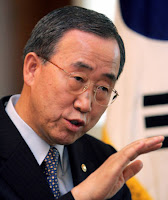Teddy Teacher's Homecoming
The Mail's leader says all that is needed over "how Britain has allowed itself to be manipulated and humiliated by a deeply amoral and tyrannical regime" over the Muhammad bear incident:
We have allowed Sudan's rulers to present themselves as behaving mercifully. The two peers who flew to Khartoum will be seen as representatives of our Parliament bending the knee.
The appeasing Foreign Office has been as hopeless handling Mrs Gibbons as it has in preventing the genocide in Darfur.
The Sudanese government, with its Janjaweed militia allies, have murdered 200,000 of their own citizens, and displaced 2million more. But despite endless international hand-wringing, the situation in Darfur is as bad as ever.
Meanwhile, Britain is one of the most generous donors to Sudan. Over the past five years, ministers have provided £333million in aid to the country; this year, we are giving another £110million.
Yet in return, we have neither managed to stop the obscenity of Darfur, nor apparently can we even protect our citizens from politically inspired malice.
Rather than kow-towing to this dreadful regime, we should cut off aid flows, insist that the UN stops dithering and puts a proper peacekeeping force on the ground, and enforce real sanctions on the country.
Dictators will never understand appeasement. Only strength of purpose.

 Two generations ago, the United Nations promised in its
Two generations ago, the United Nations promised in its ![Containers being offloaded by Sudanese army soldiers from a Russian-supplied Antonov 12 freighter aircraft onto military trucks at the military apron of El Geneina airport [Credit: Amnesty International]](http://www.amnesty.org/images/resources/sudan/demorgan/Antonov_aircraft400x260.jpg)

![A civilian killed by the Sudanese Government backed Janjaweed militia in Farawyaiah, West Darfur. The soldiers in the background are from the Sudanese Liberation Army. [Credit: Lynsey Addario at Reality Based Nation]](http://www.realitybasednation.com/images/darfur-120904b.jpg) "China appeals to all parties to maintain restraint and patience."
"China appeals to all parties to maintain restraint and patience."![Margaret Beckett with China's Foreign Minister Yang Jiechi [Credit: China Daily]](http://www.chinadaily.com.cn/china/2007-05/18/xin_3505041815493711750233.jpg) Zimbabwe, Sudan and Burma, three of the world's most oppressive regimes, all benefit from Chinese aid and trade. For instance, China sells the Sudanese government military equipment and purchases two-thirds of Sudan's oil exports. Given the country's economic interests, it is perhaps unsurprising that China should continue to use its veto on the United Nations Security Council to block efforts to send peacekeepers to Darfur.
Zimbabwe, Sudan and Burma, three of the world's most oppressive regimes, all benefit from Chinese aid and trade. For instance, China sells the Sudanese government military equipment and purchases two-thirds of Sudan's oil exports. Given the country's economic interests, it is perhaps unsurprising that China should continue to use its veto on the United Nations Security Council to block efforts to send peacekeepers to Darfur. Ahead of tomorrow's
Ahead of tomorrow's  A United Nations exhibit that was supposed to be opened by U.N. Secretary-General Ban Ki-moon yesterday has been delayed following Turkish objections to the inclusion of the above sentence. Speaking on the thirteenth anniversary of the Rwanda genocide in which 800,000 Rwandans were slaughtered in an orchestrated campaign, Mr Ban called for a "global partnership against genocide" and made the U.N. special adviser for the prevention of genocide a full-time post.
A United Nations exhibit that was supposed to be opened by U.N. Secretary-General Ban Ki-moon yesterday has been delayed following Turkish objections to the inclusion of the above sentence. Speaking on the thirteenth anniversary of the Rwanda genocide in which 800,000 Rwandans were slaughtered in an orchestrated campaign, Mr Ban called for a "global partnership against genocide" and made the U.N. special adviser for the prevention of genocide a full-time post.
